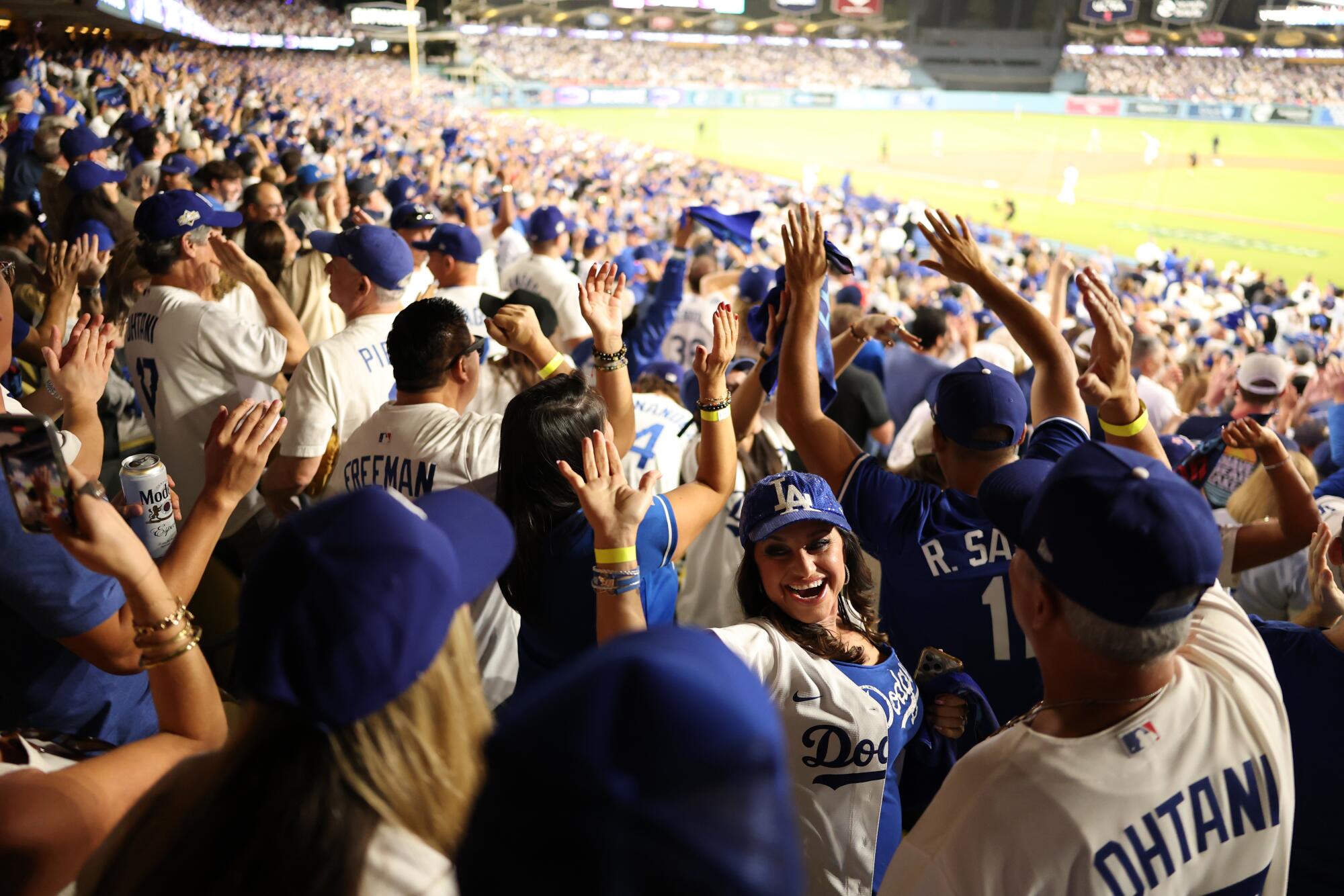If this World Series turns into a food fight over the economics of baseball, Dave Roberts threw the first meatball.
The Dodgers had just presented the National League Championship trophy. Roberts, the Dodgers manager, had a lot to say to the sold-out crowd at Dodger Stadium and the audience watching on national television.
“They said the Dodgers were ruining baseball.” Roberts shouted. “Let’s get four more wins and really destroy baseball.”
The Dodgers just beat the Milwaukee Brewers. the team that did everything rightwith four starting pitchers whose contracts total $1.35 billion.
The Brewers led the major leagues in wins this year. They've made the playoffs seven times in the last eight years, yet their previous manager and general manager fled to the big cities in hopes of applying small-market guile to big-market teams.
This year, the Dodgers will spend half a billion dollars on player salaries and luxury taxes, an amount the Brewers and other small-market teams may never spend in this life or the next.
The Brewers will make about $35 million in local television rights this year. The Dodgers are making 10 times that amount—and will be making more than $500 million a year by the end of their contract with SportsNet LA in 2038.
Is income inequality a problem for sports?
The owners say yes. They are expected to push for a salary cap in collective bargaining next year. The cap is anathema to the players' union. At the All-Star Game, union executive director Tony Clark called the restriction an “institutionalized conspiracy.”
The union could say, yes, income disparities are a big problem, and offer something other than a cap.
But that's not what the union says. The union disagrees that income inequality is a problem, at least to the extent that players should be involved in solving it. In other words: Tarik Skubal should not be paid less than market value as a free agent to appease the owner of the Pittsburgh Pirates.
For the most part, the union believes the owners should resolve the issue among themselves.
And the fundamental difference may be this: For most owners, the Dodgers' spending is a big problem, or at least a symptom of a bigger problem. It was Commissioner Rob Manfred. at the owners' meetings in February last year: “Do people believe that the playing field is balanced and fair, and/or do people believe that money determines who wins?”
For the union, the problem is not one of perception. The union says the problem is that the Dodgers' spending exposes other owners, who would like to have a salary cap that would provide them with a safety net, not to mention the cost certainty that could boost profits and the value of the franchise.
“The league’s players show up every day, ready to compete and ready to win,” Clark told The Times. “Excuses are not tolerated between the lines and should not be accepted beyond them.
“When off-field decision-makers reflect the competitive spirit on the field, everyone wins and the future of baseball is limitless. Fans and players alike deserve—and must demand—much more accountability from those to whom much has been given.”
Tony Clark, executive director of the MLB Players Association, speaks at a news conference in New York in March 2022.
(Richard Drew/Associated Press)
In his annual estimatesAccording to Forbes, the Dodgers' revenue last season was $752 million, while the Pirates' revenue was $326 million. By those estimates, the Pirates made a profit of $47 million and the Dodgers made $21 million.
The Pirates — and other small-market teams — earn more than $100 million each year, split equally between league revenues (such as national and international broadcast rights, as well as merchandising and licensing) and those shared by the Dodgers and other big-market teams. This means the Pirates can cover their players' salaries before selling a single ticket, beer or Primanti sandwich stuffed with meat, cheese and French fries.
“The current system is designed so that larger markets share huge amounts of revenue with smaller markets to help level the playing field,” Clark said. “Teams operating in smaller markets have other built-in advantages, and we offered more in negotiations—and will do so again.”
The union would be happy to get minimum wage, that is, minimum team wage. The owners would do this if the union agreed to the team's maximum salary, which is the salary cap.
Whether owners believe recent and potential future changes (including a draft lottery, better draft compensation for small-market teams losing free agents, giving extra draft picks to teams that move up prospects faster and small-market teams that win) can begin to mitigate income inequality is unclear. It is also unclear whether players will be able to condition the distribution of income on the result of team progress.
And, perhaps most critically for owners, the collapse of the cable ecosystem means many teams have lost local TV revenue that may never fully return, even if Manfred is able to follow through on his proposals. “all teams, all the time, in one place” service.
Whatever the problems, the fans don’t give up and don’t leave. The league sold more tickets this year than any year since 2017. Nearly every week ESPN, Fox or TNT brought announcements about ratings increases, and the league didn't complain about the outstanding ratings the Dodgers and New York Yankees received in last year's World Series.

Dodgers fans celebrate after Shohei Ohtani hits the second of his three home runs in Game 4 of the NLCS against the Brewers at Dodger Stadium on Oct. 17.
(Eric Thayer/Los Angeles Times)
Wages are under the control of the owner. Market size – no.
Of the top 15 teams by market size, six made the playoffs. Of the bottom 15 teams by market size, six reached the playoffs.
Is this a reasonable demonstration of competitive balance? Will the Dodgers winning the World Series in back-to-back years define the competitive imbalance, even if they become the first team in 25 years to repeat? The only team currently spending money like the Dodgers, the New York Mets, have not won a World Series in 39 years.
The Kansas City Chiefs have played in the Super Bowl five times in six years, winning three times. That's because they have Patrick Mahomes, not because the NFL has a salary cap.
Over the past three years, the Dodgers are the only team to appear in the final four twice, more diversity than the final four in the NFL, NBA or NHL, all of which have salary caps.
In the past, the league was happy to disseminate information like this. After a winter of chants about the Dodgers ruining baseball, the league began talking about how no small-market team had won a World Series in 10 years.
Payroll alone shouldn't determine competitive balance, but it becomes a self-fulfilling prophecy if an owner decides that competing with the Dodgers will be just as futile if he spends another $25 million on players.
It is premature to count heads now. At this point, however, you wonder if any team other than the Dodgers and Mets will lobby against the league pushing for a salary cap in negotiations. If owners really want to implement a salary cap, they should be willing to do what the NHL did to get it: shut down the league for an entire season.
We should talk about the magic of Shohei Ohtani and Mookie Betts. Instead, at its grandest stage, the conversation about baseball will be about whether its most popular team is ruining the game to the point of depriving us of it in 2027. Well done everyone.








